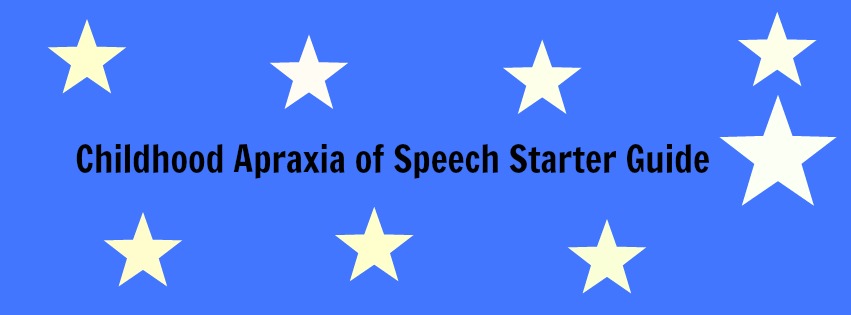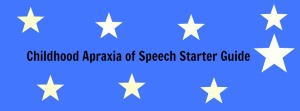What is Childhood Apraxia of Speech?
Definition and characteristics
Childhood Apraxia of Speech is a speech disorder that results from difficulty with programming, planning and sequencing the precise movements needed for clear speech.
The American Speech/Language Hearing Association (ASHA), denotes three main characteristics that must be present for a diagnosis of CAS.
- Inconsistent production on consonant and/or vowels in repeated productions of syllables and words.
- An example of the word doggy for my daughter who has apraxia ended up being produced doddy, do-yee, daddy, da-yee.
- Difficulty sequencing syllables and words of increasing complexity.
- The child might be able to say “dada,” but when words or added like “my dada” the child might say ‘da-da-da.’
- Errors with prosody
- Prosody can include syllable stress, and kids with CAS might stress the first syllable in each word: BAnana instead of baNAna or may give equal stress to every syllable BA-NA-NA.
- Can include difficulty with volume control. This was definitely true with my daughter. She could not be loud even when she tried in her younger toddler years.
- May have prolonged sounds and prolonged pauses, possibly giving the child ad staccato sound to their voice
Other soft signs that should be considered include:
Speech
- Vowel errors and/or reduced vowel inventory
- May have a tendency to reduce vowels to the schwa (uh). For example, buh-buh/bye bye.
- Groping
- The child’s mouth seems to make a lot of unnecessary movements while they “grope” for the correct placement
- Loss of words or sounds that were previously produced
- Consonant omissions in the initial position of words
- May be more successful with automatic versus volitional speech
- A child may say “mama” but then when asked to repeat “mah” may be unable to do so correctly
- Limited babbling as a baby, or limited sound variation in their babbling
- Typically comprehends much more than they can speak
Non-speech
- Oral apraxia (difficulty planning and executing non-speech oral motor movements
- May have trouble blowing raspberries, puckering, sucking out of straw or blowing out a candle
- General awkwardness or clumsiness
- Limb apraxia
- For more information on limb apraxia you can read posts from my guest occupational therapist blogger.
- Low muscle tone
- One sign of a weak core includes W sitting (see the inspired treehouse for information on this).
Who diagnoses Childhood Apraxia of Speech?
According to ASHA, a qualified Speech/Language Pathologist is the IDEAL professional to diagnose CAS. However, diagnosis can be tricky, so you want to make sure you find an SLP who has experience and/or specializes in CAS. Currently, CAS is both over-diagnosed and under-diagnosed, so don’t be afraid to ask questions to gauge your SLP’s experience and knowledge of it. A good SLP will not mind being asked questions about their experience with CAS or answering questions related to it. I created a post called ten questions to ask your SLP to help guide you or give you suggestions you can find here.
What should therapy for CAS look like?
There are many programs out there that say they are geared toward the treatment of CAS. There is a growing body of evidence that the principles of motor learning affect the most change. In short, you should be seeing:
- frequent repetitions of target sounds or words (mass practice)
- feedback that is specific. The SLP should be giving them feedback such as “you’re lips were open, not closed,” rather than just “good job” “try again” or “that was great.”
- carefully chosen speech targets that take into account the child’s current phonetic repertoire and then practicing a variety of movement gestures (sound to sound, syllable to syllable, word to word) with these sounds.
- Cues – can be visual (SLP may pop her hand out for /p/) verbal (close your lips and use your humming sound), or tactile (SLP may use physical touch cues on the child like in PROMPT).
*For other reasons your child may not be speaking, read my article Apraxia? Phonological Disorder? Language Disorder? What’s the Difference?*
CAS is a complicated disorder that is many times over-diagnosed and under-diagnosed. In addition, the treatment approach varies from other traditional speech sound disorders. If you’re a parent, don’t be afraid to advocate and ask questions. If you’re a professional, I encourage you to seek out continuing education. A wonderful resource I recommend is Childhood Apraxia Treatment to learn more. They also offer a FREE continuing education course on DTTC.
For more resources check out my post: Trainings and Resources for SLP’s on Childhood Apraxia of Speech.
Link to my book Overcoming Apraxia
Find me on:
TikTok
Laura Smith is a speech/language pathologist in the Denver Metro Area specializing in Childhood Apraxia of Speech. She owns and operates her speech therapy clinic called A Mile High Speech Therapy. She is dedicated to spreading CAS awareness. Her passion is fueled by all of her clients, but especially her own daughter who was diagnosed with Childhood Apraxia of Speech. For more information visit SLPMommyofApraxia.com


Hi,thanx for the wonderful information on childhood apraxia. I am a preschool teacher and have a little girl in my class who will be turning 3 next month. I am very concerned about her speech ability.. She does.not speek clear all the time and uses 2 word sentences most of the time. She is a very clever girl, knows and recognises fine detail and shapes , colours etc and points it out to me but struggles with speech. She is also a little bit clumsy with body movement at times. A few months back she had the fynny tendancy to go and lie in the dirt and lick the soil for long periods of time. She would also pick up strings or pieces
of material from clothes or the grpund and eat it. This has improved though in the past few months. Do you see any signs of abnormality here? Alsonto take into consideration is the fact that mommy and daddy speaks two different languages at home. She has improved slightly since I have only been speeking English wih her at school. Could this be a cause of delayed speech? I would like to speak to the parents but need an experts opinion first.
kind regards
Carike du Preez
(South Africa)
apraxia kids website
Pingback: A source of hope: Natalie's walk with apraxia - SLP Mommy of Apraxia